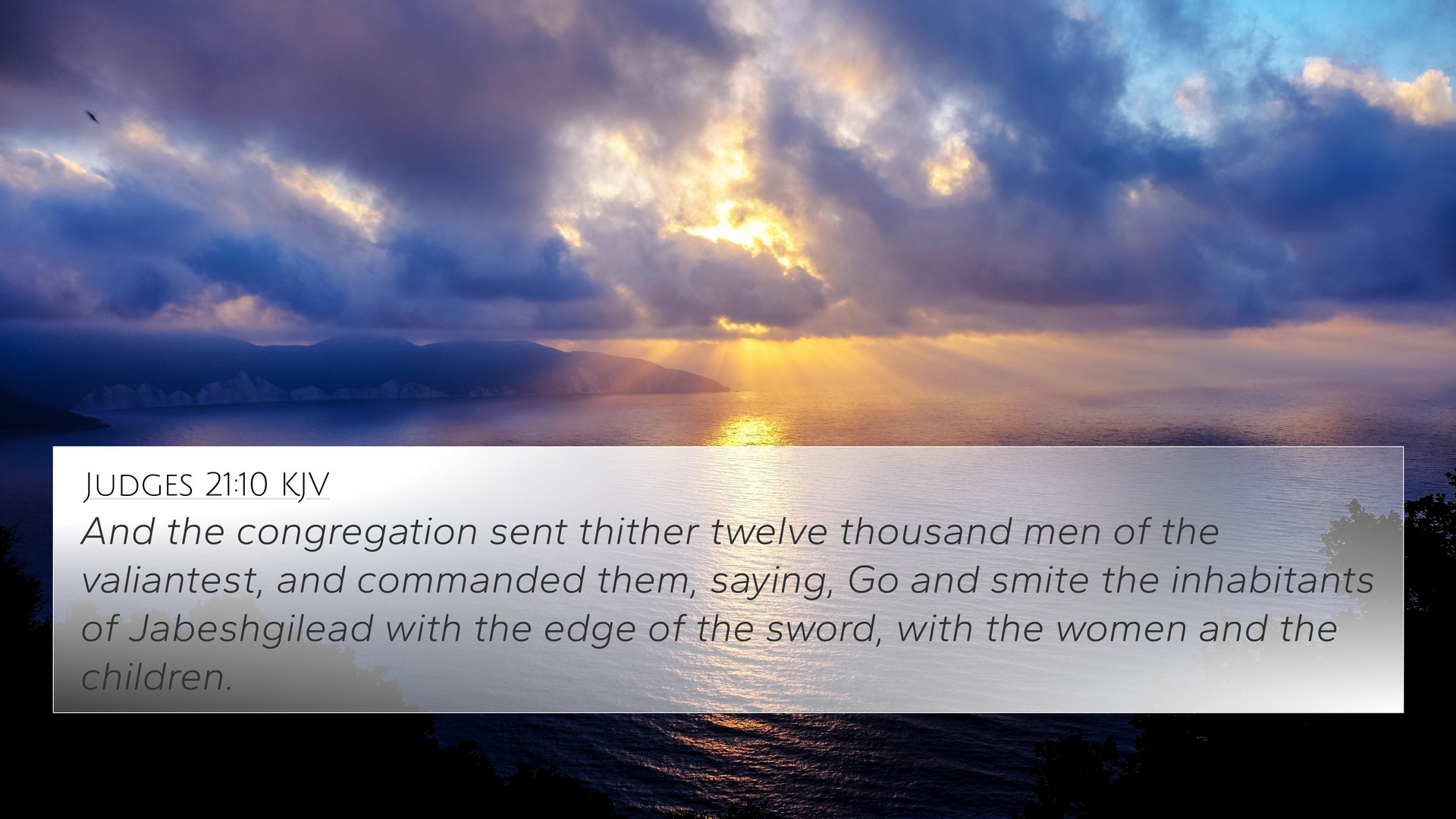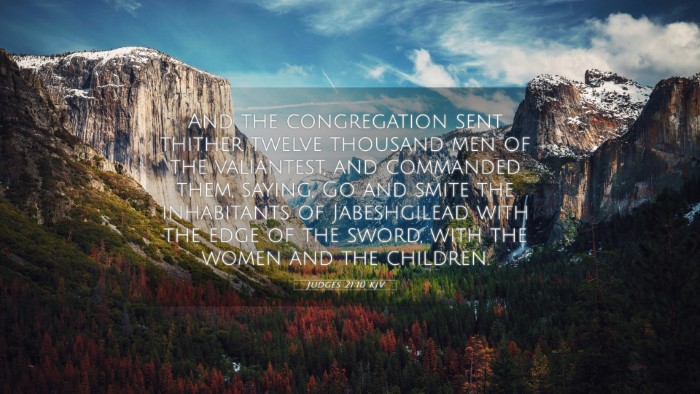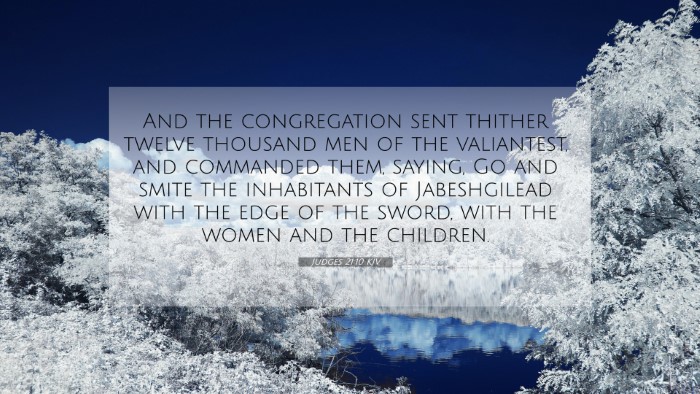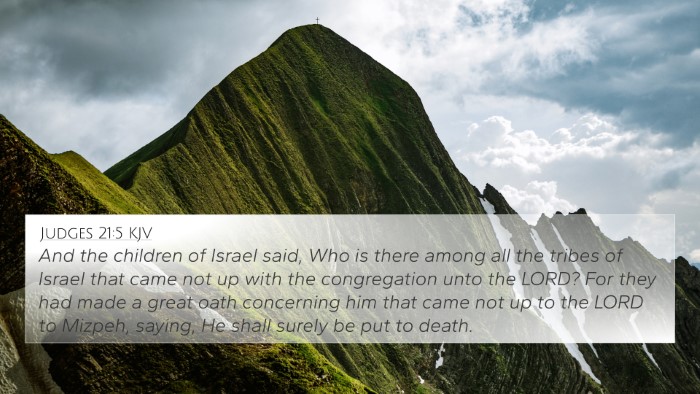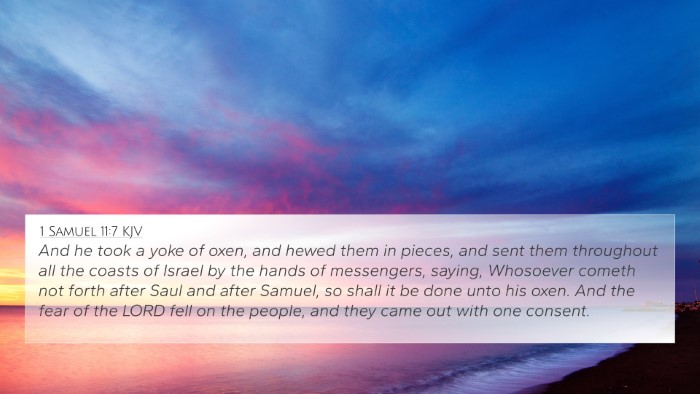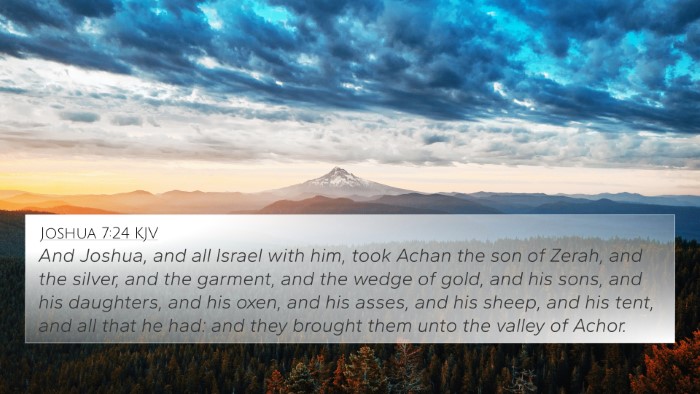Understanding Judges 21:10
Judges 21:10 states, "So the congregation sent there twelve thousand men of the valiant, and commanded them, saying, Go and smite the inhabitants of Jabesh-gilead with the edge of the sword; with the women and the children."
This verse depicts a significant moment in the history of Israel during the time of the Judges. The call to arms signifies obedience and unity among the tribes as they face a moral crisis. To fully comprehend this narrative, insights from various public domain commentaries enhance our understanding.
Contextual Background
The Book of Judges reveals a tumultuous period marked by cycles of sin, oppression, repentance, and deliverance. Judges 21 concludes the narrative by addressing the aftermath of the war against the tribe of Benjamin, highlighting a desperate attempt to provide wives to the remaining Benjamites and restoring the tribe's legacy.
Commentary Insights
-
Matthew Henry:
Henry reflects on the gravity of violence in this chapter, emphasizing the dire situation requiring the Israelites to take drastic measures. The command to "smiting" suggests a fulfillment of vows and also condemns the moral decay present. The urgency of the command illustrates the severity of the Israelite's plight.
-
Albert Barnes:
Barnes examines the strategic execution of God's judgment upon Jabesh-gilead. He notes that this city had not united with others in the battle against Benjamin, suggesting that their indifference warranted punishment. The act also serves to convey the severity of sin and collective accountability.
-
Adam Clarke:
Clarke provides a theological reflection on the implications of this assembly and violent directive. He argues that this reflective instant crucially highlights the need for divine restoration. Clarke suggests that the labor behind the martial command underlines a unique challenge that the Israelites had to confront as they navigated their identity as a covenant nation.
Bible Verse Cross-References
To deepen our understanding, we identify several cross-references that illustrate the themes discussed in Judges 21:10:
-
Deuteronomy 20:13-14: Discusses the commands regarding warfare and treatment of conquered people.
-
1 Samuel 11:1-3: Relates to the rallying of Israel against a common enemy, underscoring the unity during crises.
-
Judges 20:48: Provides context on the war against the tribe of Benjamin, illustrating the severe measures taken by Israel.
-
Joshua 21:8: Highlights the designation of cities and emphasizes the importance of community and territorial possession.
-
2 Samuel 2:5-7: Connects to the theme of revenge and honor within kinship ties, reflecting tragic decisions.
-
Genesis 34:25: Discusses violent retribution further exemplifying societal responses to perceived injustices.
-
Romans 12:19: Highlights New Testament theological reflection on vengeance, contrasting Old Testament command.
-
Matthew 26:52: Offers a New Testament perspective on the use of swords in conflict, promoting peace over violence.
-
Ephesians 6:12: Communicates the broader spiritual warfare message urging believers to recognize the true battles not of flesh and blood.
Connections Between Bible Verses
The narrative of Judges 21:10 is tied intricately to many other Biblical texts, giving rise to a rich tapestry of theological exploration.
By employing tools for Bible cross-referencing, such as a Bible concordance or Bible cross-reference guide, one can identify thematic connections that transcend individual verses.
Thematic Bible Verse Connections
The interconnectedness of scripture offers insights into broader themes of justice, judgment, and reconciliation.
These themes are prevalent from the Old Testament narratives to New Testament teachings, demonstrating a cohesive divine purpose throughout scripture.
Conclusion
Judges 21:10 serves as a reminder of the complexities of Israel's history marked by both divine judgment and the necessity for covenant faithfulness.
By examining scriptural parallels and engaging in cross-referencing Biblical texts, one can appreciate the rich narrative and theological significance present in this passage.
